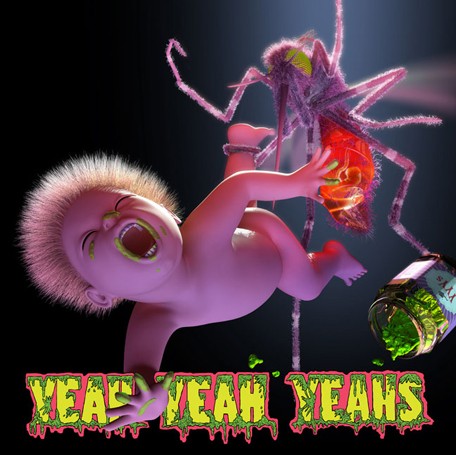When Yeah Yeah Yeahs landed ten or so years ago, they were a garish, arty, technicolour scrawl of protest against the largely dreary rock & roll revivalism that then held sway. It was hard to keep your eyes or ears off this trio of aural vandals. Their subversive subtext was what made their trashy art-punk so attractive and led to under-the-hand giggles every time debut single ‘Bang’ was played on the radio with its uncensored lyric: "As a fuck son, you suck."
In Karen Orzolek you had a frontwoman who was as cocksure as she was enigmatic. Guitarist Nick Zinner possessed a talent that outshone the mere craftsmanship of his peers, and Brian Chase’s drumming served as a rock amid the raucousness. Relationships within the band seemed satisfactory and functional as debut album Fever To Tell dropped in 2003, but cracks soon began to show. In-fighting, depression and distance (physical and emotional) have all affected the group’s collective psyche over time, and yet despite all the inner turmoil they have continued to find routes to innovation as contemporaries flailed in the distance.
The band have thus far shape-shifted their sonic identity from album to album, but this fourth offering finds them mixing and matching, as they splice the fuzz-toned scuzz-rock of Fever To Tell with the layered textures of Show Your Bones and the synth-pop sheen of It’s Blitz. The ornate Mosquito also externalises the band’s anxiety and paranoia, not least with its artwork, in which the clean, crisp aesthetic of It’s Blitz gives way to a disturbing homage to the Garbage Pail Kids.
‘Slave’, with its moan of "You keep me your slave", draws into the band’s fractious relationships and ceaseless co-dependency. On ‘Buried Alive’, we’re instructed: "Free yourself. That leash is long, long, long." Elsewhere, the title track fixates on the lifecycle of a blood-sucking insect. "Mosquito sing, mosquito cry," sings Orzolek, before a screed of: "He’ll suck your blood!" As metaphors go, these are hardly ones to suggest that perfect in-band harmony has been attained.
Each member has side-projects beyond the band – Orzolek has ventured into soundtracking and opera, Zinner into photography exhibitions and Chase into experimental jazz – but it’s still obvious the power of three can exceed the sum of the parts. That’s particularly striking during bombastic, salacious opener ‘Sacrilege’" Backed by a gospel choir, Orzolek here adds her banshee squawk to Chase’s strident drums and the subtle brilliance of Zinner’s guitar playing.
It may be a shortcoming of the album that not more is made of Zinner’s trademark sound, absent amid the brash synths of ‘Always’, dubby basslines of ‘Under The Earth’, train samples on ‘Subway’ and a guest appearances from Dr Octagon (AKA Kool Keith) on ‘Buried Alive’. Orzolek, meanwhile, can be credited with exploring new ground. On ‘These Paths’, she flits between a breathy, resolute vocal reminiscent of Tricky-era Martina Topley-Bird, and a gravity-defying falsetto akin to Polly Jean Harvey’s. On the alien-themed ‘Area 52’, she evokes Iggy Pop with a burley roar of: "I want to be your passenger. Take me as your prisoner". It verges on the moronic, but does offer contrast to the album’s more forlorn tracks, such as ‘Wedding Song’ and ‘Despair’.
‘Mosquito’ may conjure a similar frenzy to the Yeah Yeah Yeahs’ previous three albums, but it paints a disjointed picture of the band’s turbulent history, on an already messy canvass. But then, this New York City trio were never about pretty colours, clean lines and crowd-pleasing. For that, perhaps we should be grateful.


